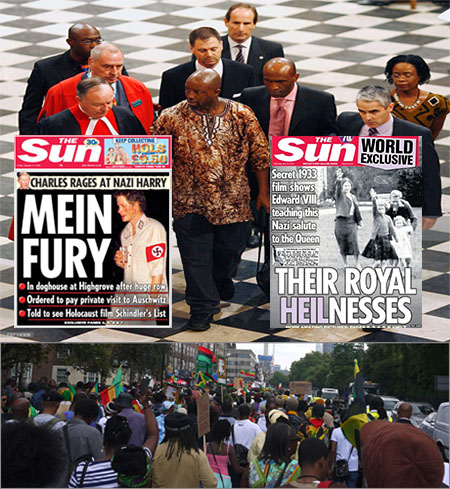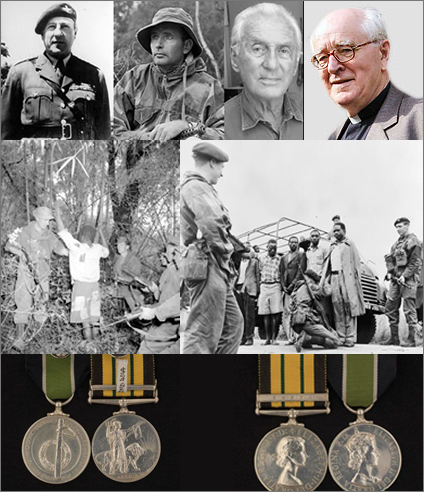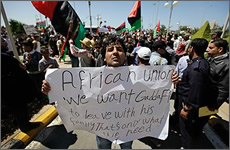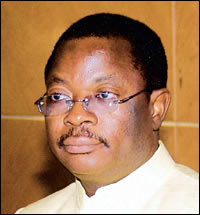Ligali identified perpetrators backed with evidence from African survivors of some of the crimes British officers were responsible for during 1950 – 1963. Excluding murder and enslavement, some of the criminal acts included the torture and rape of teenagers, men being anally assaulted with knives, broken bottles, rifle barrels, snakes and scorpions. Detainees were burned alive, women were gang-raped by guards and others experienced mauling by dogs, electrocutions and the sadistic mutilation of their sexual organs.
In 2013, the original acting investigating officer, Detective Sergeant Gary Titherly wrote to Toyin Agbetu at Ligali explaining that several of the named suspects serving in Kenya during the ‘mau mau’ emergency of the 1950 – 60’s have died. Titherly did not name who was still alive however Ligali’s original list of identified perpetrators where access to relevant evidence existed of their justiciable offences included John Cowan, Second Lieutenant David Larder, Terence Gavaghan, Alan Lennox-Boyd, and Eric Griffiths-Jones.
Two years later in correspondence dated 23 July 2015, the Metropolitan Police wrote to Toyin again, this time it was Detective Constable Alex Phillips of the Met's SO15 - War Crimes Team who apologised for the length of time it took to reach this stage where no prosecution would take place and wrote ‘[despite] an interview of one male under caution. The case against this male will not be proceeded with following the CPS advice’.
The CPS has gained a reputation of choosing not to prosecute elderly European males responsible for historic cases of abuse against vulnerable people. Alison Saunders, Director of Public Prosecutions (DPP) was widely criticised for opting not to bring charges against 86 year old, Greville Janner, the peer and former Labour MP, accused of sexually abusing a number of children because of the “severity” of his dementia. This contradicts the words of Saunders when she took over the role DPP in November 2013 and claimed she intended to keep pursuing such cases and suggested that the public would be “horrified” if complaints about historical abuse did not lead to prosecutions.
An angry Toyin Agbetu said he remains disappointed by the failure of journalists in the British print and broadcast media to cover this story. He suggested that with media pressure from national and local newspapers alongside talk and community radio stations there might have been a better outcome. He continued by stating he will not stop working for reparatory justice on behalf of his Ancestors and self-reparations through education for his community despite this setback.
In 2007 Toyin spoke directly to the British queen o this topic during a self-congratulatory ritual at Westminster Abbey celebrating William Wilberforce and Britain's alleged leading role in so called abolition. He told the British monarch and head of state that “in the history of the Maafa the British are the Nazi’s... but where the germans have apologised and reparated you have not done so, in so doing you shame not only yourself but your nation”.

Top: Toyin tells Queen she should be ashamed, that in history of Maafa the British are the Nazis (Westminister Abbey, 27 March 2007) Bottom: Thousands attend Reparations March (London, 1st August 2014)
Rise in demands for reparatory justice
Less than a fortnight ago Oskar Gröning, the 94-year-old former Nazi officer was sentenced to four years in prison for his book-keeping role at Auschwitz. Although Gröning did not personally cause the physical harm meted out to an estimated 300,000 Jew victims, the German legal system recognised that justice must be serve despite his age and “safe desk job”. In this investigation of Maafa war crimes some of the perpetrators identified by Ligali were those directly involved in torture, rape and abuse. Tragically for African survivors, Maafa war criminals such as Major-General Ian Stuart McWalter Henderson aka the ‘Butcher of Bahrain’, Lieutenant General Sir Gerald, Evelyn Baring, the governor of Kenya and Frederick Crawford, the Deputy Governor of Kenya from 1953 to 1957 died before justice could catch up with them.
Toyin Agbetu said “It would seems that access to justice for African people continues to be decided through an immoral hierarchy of suffering. Victims and survivor-descendants of the Shoah (Jewish holocaust) have been served well by Nazi hunters, Holocaust remembrance days, apologies, acts of atonement and wide ranging reparations from those responsible for facilitating their unjust suffering. In contrast victims and survivor-descendants of Maafa (African enslavement and its legacy) have been denied moral, political, spiritual and economic justice at every turn. Most Britons engage with Maafa denial unless they are connected to those teaching about Pan-African freedom fighters and liberation movements based both in the Diaspora and the Motherland.”
Nonetheless, 2015 has seen the topic of reparations gain traction. A debate at Oxford Union on 28 May named ‘This House Believes Britain Owes Reparations to her Former Colonies’ concluded with a yes vote. This marks a u-turn to the votes cast by the same debating society during a similar debate on 26 November 2009 under the title ‘This House would make Reparations for Colonialism’. At this Oxford union debate, Ligali’s Toyin Agbetu was joined by Professor John Newsinger and Lord Parekh against a panel consisting of Nikolai Tolstoy, Dr Tiffany Jenkins and Philip van der Elst. During that debate an overwhelmingly hostile audience attacked Toyin and his arguments and voted against reparations.
There has also been a recent two part BBC documentary broadcast utilising ground breaking UCL research on the Legacies of British Slavery uncovering the untold stories of ‘Britain's Forgotten Slave Owners’. In it the historian David Olusoga explored the fallacy of monetary compensation being a measure of justice, when in the case of Maafa it is clearly a provider of further unjust enrichment.
However whilst the Indian prime minister Narendra Modi endorsed the idea of Britain paying damages to India for colonial rule following Shashi Tharoor representations in the 2015 debate based on centuries of economic destruction by the British, African activists have long been looking at reparations as more than just a compensatory cash pay-out.
With the growth of movements such as #whitecurriculum and #RhodesMustFall, educational institutions have been implicated and challenged for utilising biased pedagogical practices that indoctrinate societies in philosophical practices and beliefs that perpetuate racist myths, thinking and behaviour. Its impact is felt across Europe, America, Asia and Africa itself. With the adoption of a holistic approach to reparation inclusive of demands for justice - movements like #BlackLivesMatter have helped globalise awareness of the injustice faced by millions of African people as a result of the institutionally racist state apparatus operating in America and across Europe.
On 1st August an annual reparations march highlighting the continued injustices faced by African people across the world will take place in London leaving from Windrush Square, Brixton at 11am. The campaign slogan – “education is preparation for reparation” seeks to highlight how the failure of successive governments to make reparations despite reaping the ill-gotten profits of Maafa contributes to anti-African racism across the world and the continuing exploitation of Africa’s natural and human resources.
Toyin suggests “the march is one way Africans in the UK can register their concerns over the tragic loss of African life, be they the academic and entrepreneurial deaths of young potential in jobs, schools and universities or the loss of life of innocent women and children like Sandra Bland, Eric Gardner and Tamir Rice, the congregation at the Charleston massacre and people like Sean Rigg, Frank Ogboru, Ese Alabi, Jimmy Mubenga, Joy Gardner, Christopher Alder, Rocky Bennet, Mark Duggan and so many others attacked by entrenched bastions of white supremacy.”
Toyin who recently participated in a Reparation Education Weekend hosted by the RMT continued; “It is essential we work hard to educate those around us how to successfully challenge Maafa denial and the media’s conflation of reparations with compensation instead of justice.
Anti-African racism thrives in a climate of ignorance which will exists as long as Pan-African history is narrowed down to a simplistic polemic about ‘blacks’, ‘whites’ and ‘slavery’ and so called abolition instead of civilisation, freedom fighting and the birthplace of spirituality, rationality and humanity itself.”

British War Criminals (Top): Gerald Lathbury, Ian Henderson, Terence Gavaghan, John Allen (Middle) British Army humiliate children and terrorise Africans in Operation Scaramouche
External Links
‘Auschwitz book-keeper’ Oskar Groening sentenced to four yearsThis House Believes Britain Owes Reparations to her Former ColoniesRMT commended for hosting Reparations Education SchoolThousands of Africans unite for Reparations March 2014Stop the Maangamizi - we charge genocide ecocide
Ligali is not responsible for the content of third party sites
Police ‘scope’ viability of Mau Mau war crimes investigationCPS to investigate British ‘mau mau’ war crimes
Speak Out!
What does reparation look like to you – compensation or justice? How can we establish a Peoples International Tribunal for Global Justice to ensure there is a ‘Nuremberg’ like trial for our Ancestors and the survivor-descendants of Maafa?Click here to speak out or read (7) comments about this article
Following CPS advice it has been decided there will be no further police action with regard to your complaint. The scoping exercise has included extensive research of police indices, liaison with British military and an interview of one male under caution
Detective Constable Alex Phillips SO15 - War Crimes Team, Metropolitan Police Service
See Related:





Get involved and help change our world